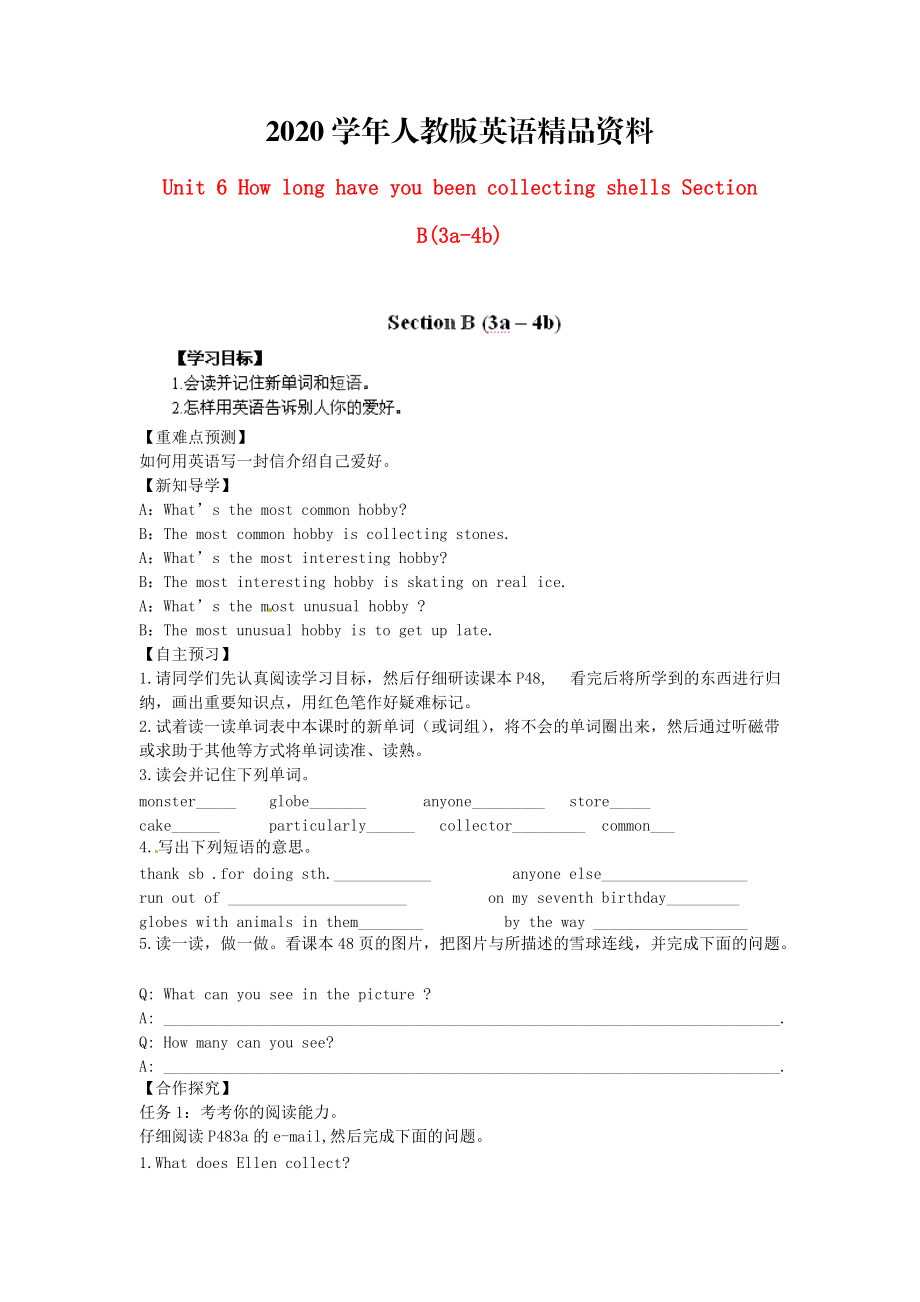《2020江西省八年級(jí)英語下冊(cè) Unit 6 How long have you been collecting shells Section B(3a4b)導(dǎo)學(xué)案 人教新目標(biāo)版》由會(huì)員分享,可在線閱讀,更多相關(guān)《2020江西省八年級(jí)英語下冊(cè) Unit 6 How long have you been collecting shells Section B(3a4b)導(dǎo)學(xué)案 人教新目標(biāo)版(3頁珍藏版)》請(qǐng)?jiān)谘b配圖網(wǎng)上搜索�。
1、2020學(xué)年人教版英語精品資料
Unit 6 How long have you been collecting shells Section B(3a-4b)
【重難點(diǎn)預(yù)測(cè)】
如何用英語寫一封信介紹自己愛好�。
【新知導(dǎo)學(xué)】
A:What’s the most common hobby?
B:The most common hobby is collecting stones.
A:What’s the most interesting hobby?
B:The most interesting hobby is skating on real ice.
A:What
2、’s the most unusual hobby ?
B:The most unusual hobby is to get up late.
【自主預(yù)習(xí)】
1.請(qǐng)同學(xué)們先認(rèn)真閱讀學(xué)習(xí)目標(biāo)�,然后仔細(xì)研讀課本P48, 看完后將所學(xué)到的東西進(jìn)行歸納,畫出重要知識(shí)點(diǎn)�,用紅色筆作好疑難標(biāo)記。
2.試著讀一讀單詞表中本課時(shí)的新單詞(或詞組)�,將不會(huì)的單詞圈出來,然后通過聽磁帶或求助于其他等方式將單詞讀準(zhǔn)�、讀熟。
3.讀會(huì)并記住下列單詞�。
monster_____ globe_______ anyone_________ store_____
cake______
3、 particularly______ collector_________ common___
4.寫出下列短語的意思�。
thank sb .for doing sth.____________ anyone else__________________
run out of ______________________ on my seventh birthday_________
globes with animals in them________ by the way ___________________
4、
5.讀一讀�,做一做??凑n本48頁的圖片,把圖片與所描述的雪球連線�,并完成下面的問題。
Q: What can you see in the picture ?
A: ____________________________________________________________________________.
Q: How many can you see?
A: ____________________________________________________________________________.
【合作探
5�、究】
任務(wù)1:考考你的閱讀能力。
仔細(xì)閱讀P483a的e-mail,然后完成下面的問題�。
1.What does Ellen collect?
_______________________________________________________________________________
2.How long has she been collecting them?
_______________________________________________________________________________
3.How many does she
6�、have?
_______________________________________________________________________________
任務(wù)2 :寫寫自己的收藏�。
仿照3a的格式,以P47/2a Bob, Marcia , Liam 的口吻�。給你的朋友寫寫你的收藏。然后小組互改糾錯(cuò)�。
_______________________________________________________________________________________________________________________________________
7、_____________________________________________________________________________________________________________________________________________________________________________________
8�、
任務(wù)3:收藏大探索
世界上收藏品五花八門,你知道最普遍的收藏是什么嗎�?最有趣的收藏是什么嗎?最不尋常的收藏是什么嗎�?和你的組員交流一下�,你會(huì)發(fā)現(xiàn)更大的驚喜。
______________________________________________________________________________________________________________________________________________________________________________________________________________________
9�、__________________________________________________________________________________________________________________________________________________
考點(diǎn)聚焦
run out of“用完,用盡”主語是人�。run out“用完,用盡”主語是物�。是不及物動(dòng)詞,不用于被動(dòng)語態(tài)中�。
練一練:
用run out of / run out 的適當(dāng)形式填空。
1. Have
10�、 you___________ all the paper?
2. All the money____________ yesterday.
◆ room 既可以表示“房間”是可數(shù)名詞。當(dāng)表示“空間”是不可數(shù)名詞�。
練一練:
英漢互譯。
1.這棟房子有十個(gè)房間。
______________________________________________________________________________
2.The bus is too crowded, we don’t have any room for you .
______________________
11�、_________________________________________________________
◆thanks for 表示感謝的原因。thanks to 表示“多虧了”�,不表示感謝,只說明事情發(fā)生的背景�,相當(dāng)于with the help of或because of
練一練:按要求完成下列題目
( )1.______the fine weather, we can finish the work on time. (選擇)
A thanks for B Thanks to C Thank for D Thank to
2.謝謝你幫助我!
12�、(翻譯)
_______________________________________________________________________________
3.多虧他的幫助,我才能夠?qū)W好英語�。(翻譯)
_______________________________________________________________________________
【學(xué)案整理】
___________________________________________________________
_____________________________________
13、____________________________________________________________________________________________________________________________________________
Section B (3a– 4b)
練一練:1. run out of 2. ran out
練一練:1.There are ten rooms in this house.
2.公共汽車太擠啦�,我們沒有位置給你。
練一練:1.B 2.Thanks for your help.
3.Thanks to his help ,I can learn English well.
 2020江西省八年級(jí)英語下冊(cè) Unit 6 How long have you been collecting shells Section B(3a4b)導(dǎo)學(xué)案 人教新目標(biāo)版
2020江西省八年級(jí)英語下冊(cè) Unit 6 How long have you been collecting shells Section B(3a4b)導(dǎo)學(xué)案 人教新目標(biāo)版

